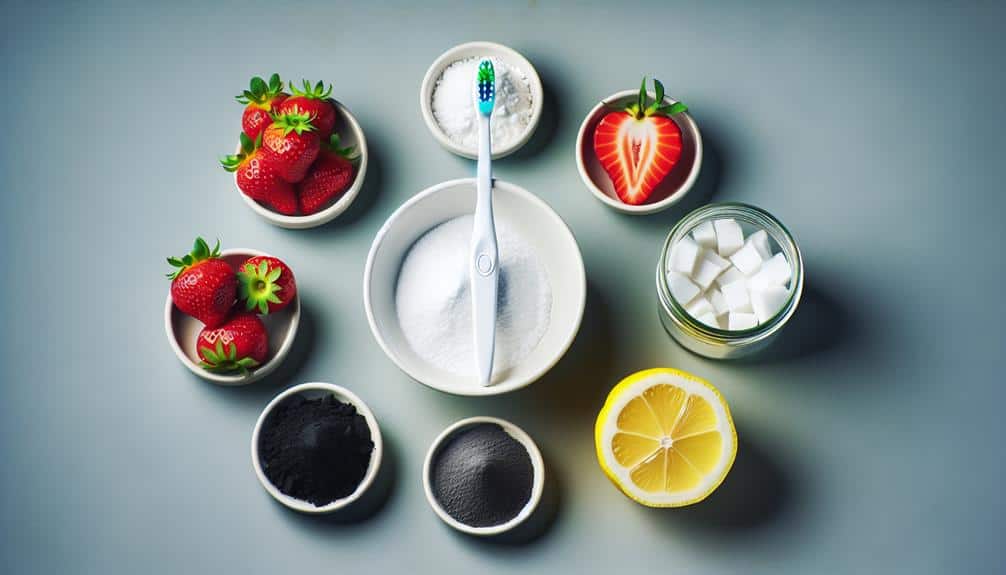Brighten your teeth naturally with three effective methods. Start with oil pulling using coconut oil; swish a tablespoon in your mouth for 15-20 minutes and follow up with a lemon rinse for stain removal. Try the gentle abrasiveness of baking soda by mixing it with water into a paste for brushing, ensuring not to overuse to protect your enamel. Turmeric, with its curcumin properties, helps combat bacteria in your mouth for a holistic oral care approach. These natural options can give you a healthier and brighter smile.
Key Points
- Oil pulling with coconut oil for 15-20 minutes boosts oral health and whitens teeth naturally.
- Brushing with coconut oil on a toothbrush harnesses its antibacterial properties for a brighter smile.
- Baking soda paste gently removes surface stains, but caution is needed to protect enamel.
- Turmeric's curcumin fights bacteria and inflammation, making it a gentle, natural whitening option.
- Lemon rinse after oil pulling aids in whitening teeth due to citric acid's stain removal properties.
Oil Pulling for Whiter Teeth
To achieve whiter teeth naturally, consider incorporating oil pulling into your oral care routine. Oil pulling is an ancient practice that involves swishing oil around in your mouth to remove bacteria and promote oral hygiene. One popular method is to use coconut oil for oil pulling due to its antimicrobial properties. Simply swish one tablespoon of coconut oil in your mouth for about 15-20 minutes before spitting it out.
In addition to oil pulling, you can enhance the whitening effects by incorporating a lemon rinse into your routine. Mix freshly squeezed lemon juice with an equal amount of water and swish it around your mouth for a minute before rinsing thoroughly with water. The citric acid in lemon can help remove stains and brighten your teeth.
Furthermore, consider coconut brushing as a natural way to whiten your teeth. Use a small amount of coconut oil on your toothbrush instead of toothpaste and brush as usual. Coconut oil has been shown to have antibacterial properties that can benefit oral health. Incorporating these natural methods into your oral care routine may help you achieve a brighter smile.
Baking Soda Teeth Whitening
For a natural approach to achieving whiter teeth, consider incorporating baking soda into your oral care routine. Baking soda, or sodium bicarbonate, is a mild abrasive that can help remove surface stains on your teeth, making them appear brighter.
To create a simple baking soda teeth whitening paste, mix a small amount of baking soda with water to form a paste-like consistency. Gently brush this mixture onto your teeth for about two minutes, then rinse thoroughly.
While baking soda can be effective in brightening your smile, it's crucial to use it cautiously. Overuse of baking soda can wear down the enamel on your teeth, leading to sensitivity and other dental issues. Additionally, combining baking soda with acidic substances like lemon juice or strawberries can further erode enamel due to their low pH levels.
To protect your teeth while using baking soda, it's advisable to limit its use to a few times a week and to brush gently. If you experience any sensitivity or discomfort, discontinue use and consult your dentist for personalized advice.
Turmeric Teeth Brightening
Enhance your smile naturally with turmeric's teeth-brightening properties. Turmeric, known for its vibrant color and numerous health benefits, can also contribute to a brighter smile. Here are four ways turmeric can help whiten your teeth:
- Anti-inflammatory properties: Turmeric contains curcumin, a compound known for its anti-inflammatory effects, which can help reduce gum inflammation and promote overall oral health.
- Antimicrobial effects: The antimicrobial properties of turmeric can help combat bacteria in the mouth, reducing plaque buildup and contributing to fresher breath.
- Stain removal: Turmeric's abrasive texture can assist in removing surface stains on teeth caused by coffee, tea, or smoking, revealing a brighter smile.
- Natural alternative: Using turmeric as a teeth-whitening agent is a natural remedy that avoids harsh chemicals present in many commercial whitening products, making it a gentle option for those seeking a more holistic approach to oral care.
Frequently Asked Questions
Can Natural Methods for Brighter Teeth Cause Any Adverse Side Effects?
Natural methods for brighter teeth, when used improperly, can indeed cause adverse side effects. Lemon juice risks damaging enamel, and charcoal dangers include abrasion and potential staining. Always consult with a dental professional before trying new methods.
How Often Should Oil Pulling Be Done to See Results?
For best results with oil pulling, consistency is key. To see effectiveness, aim for daily oil pulling sessions. Making it a routine part of your oral care regimen can help achieve brighter teeth.
Are There Any Specific Toothpaste Brands That Work Best With Baking Soda Teeth Whitening?
For toothpaste recommendations that work well with baking soda teeth whitening, look for brands containing fluoride and baking soda. This combination can enhance the effectiveness of baking soda in whitening teeth while providing essential cavity protection.
Can Turmeric Teeth Brightening Stain the Teeth or Cause Discoloration?
Using turmeric for teeth whitening can be effective, but improper application may lead to staining. Its whitening effectiveness is influenced by consistency and duration. To mitigate potential staining, guarantee proper usage techniques.
Is It Safe to Combine Different Natural Methods for Brighter Teeth, Such as Oil Pulling and Turmeric Teeth Brightening, for Enhanced Results?
When combining natural remedies for brighter teeth, like oil pulling and turmeric, it's generally safe. Such methods can enhance effectiveness. However, always be cautious of potential interactions or sensitivities. Better safe than sorry!



